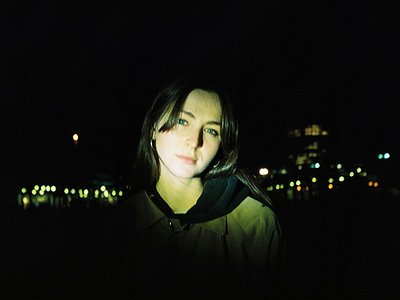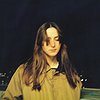Part 1
Name: ronja
Nationality: German
Occupation: Singer, songwriter
Current release: ronja's For Annette EP is out via Unguarded. Buy a physical copy here.
Recommendations: Virginia Woolf - A Room of One’s Own; Michael Ende - Der Spiegel im Spiegel. Ein Labyrinth.
If you enjoyed this ronja interview and would like to keep up to date with her music, visit her official homepage. She is also on Instagram.
When I listen to music, I see shapes, objects and colors. What happens in your body when you're listening? Do you listen with your eyes open or closed?
My experience of listening to music can vary widely. It’s based on several factors, including the type of music, my surroundings, how I feel about myself in the moment and who I am with.
Whether I keep my eyes open or closed during a listening session depends on the circumstances. Closing my eyes allows me to explore intricate emotions and the imagery it conjures. Sometimes, listening to music can even be a numbing experience, on the brink of subconsciousness. It's a state of mind where I fully immerse myself into the music and everything else just fades out.
Then again, listening to music can also be a very bonding experience, no matter if I have my eyes open or closed. And for some songs or lyrics it's almost as if they store memories and emotions for me. Listening to them is like traveling, to places both real and imagined.
In essence, listening to music is a blend of emotions, memories, and sensations, shaped by the music itself, my environment, and the people I'm sharing it with.
What were your very first steps in music like and how would you rate the gains made through experience - can one train/learn being an artist?
The concept of "the artist" is elusive to me to begin with. What exactly makes one an artist? Is it the act of creation, the sharing of one's music or art, or a reflection of life itself? For me, the essence of being an artist has always been deeply rooted in human connection and the sense of community.
The term "artist" carries a professional connotation, which, at times, feels restrictive to me. I've found that professionalism can add undue pressure and make me overly self-aware. I prefer the process of making music to be spontaneous and unpolished, emphasizing the raw, playful, and organic elements of musical expression.
It's about working with what's within me and within the connection to others.
According to scientific studies, we make our deepest and most incisive musical experiences between the ages of 13-16. What did music mean to you at that age and what’s changed since then?
During the ages of 13 to 16, I was immersed in the world of classical music, studying the flute at a music academy. It was a time when I saw playing and listening to music as two distinct pursuits.
My focus was primarily on playing classical compositions. I was deeply engaged in perfecting my technical skills and channeling emotion through classical pieces. I was dedicated to precision and the mastery of the flute, while I listened to singer-songwriter, pop, and rock music. Surprisingly, I rarely listened to classical music during this period.
However, I do distinctly remember the impact of listening to Schubert's "Winterreise," which resonated deeply with me.
When I was 14 I bought myself a guitar and this radically changed my perspective on music. It opened up a new world of exploration, embracing improvisation in chord transitions and adding melodies, and occasionally even words. It was a playful and imperfect approach that redefined my understanding of music.
This experience still influences my musical approach today. I like the idea of “not knowing“, for example, experimenting with different tunings to free myself of the knowledge I have.
What, would you say, are the key ideas behind your approach to music and what motivates you to create?
The music I write is driven by emotion. And to me, that really is what music is all about. It allows me to delve into the depths of my own feelings and connect with the emotions of others.
In the end, my own experiences, whether they are joyful or challenging, are the most important source of inspiration to me. It's through these experiences that I find stories to tell and emotions to convey. My music is a reflection of life, capturing its intricacies and nuances.
Another fundamental aspect of my approach is playfulness. Music, at its core, is a form of creative play. There's a childlike joy in making music, a sense of freedom and experimentation that transcends the boundaries of structure and formality. This playfulness infuses a sense of spontaneity and authenticity into my work, allowing me to craft music that feels organic and alive.
Ultimately, what motivates me to create is the profound and indescribable connection that music forges between the creator and the listener. It's a way of communicating emotions, stories, and experiences that transcend words.
To quote a question by the great Bruce Duffie: When you come up with a musical idea, have you created the idea or have you discovered the idea?
For me, the process of coming up with a musical idea is an act of discovery. I find inspiration in the world around me, and my ideas often emerge from various sources, such as conversations with people, music I listen to, books I read, and films I watch.
There are occasions when I might enter my studio with a specific goal in mind. Perhaps I intend to craft a B part reminiscent of a particular song or experiment with similar vocal sounds.
Even in these moments of intentionality, the creative process transforms into discovery. I find that these initial intentions often serve as a catalyst for something “new“– whatever "new" means, of course. Is this where the boundaries of inspiration and originality blur, and creation begins?
Creation might happen when these inspirations and influences are woven together in a unique way that reflects my perspective. It's in this synthesis that the idea truly comes to life. It's not a mere copy of the original sources but a new creation that's inspired by them.
Paul Simon said “the way that I listen to my own records is not for the chords or the lyrics - my first impression is of the overall sound.” What's your own take on that and how would you define your personal sound?
When I first engage with a record, my initial impression is centered on the overall sound and the atmosphere it creates. The sonic world, the textures, and the vibe of a piece of music are what draw me in.
However, as I delve deeper into a song, I find myself getting excited about lyrics and memorable melodies. While the overall sound sets the stage, it's the lyrics and melodies that often become the emotional anchors, shaping the narrative and making a lasting impact.
In terms of my personal sound, I believe it can be defined as a blend of melancholic, discrete sounds, and vibrant melodies. I strive to create music that feels intimate, almost as if it's whispered close to the listener's ear, while also bearing a sense of vibrancy that captivates the senses.
Someone once described my music as “light“ and I like the image. A warming, comforting yet fragile sound, leaving space, distant but delivered with intensity.
Sound, song, and rhythm are all around us, from animal noises to the waves of the ocean. What, if any, are some of the most moving experiences you've had with these non-human-made sounds? In how far would you describe them as “musical”?
One of the most comforting sounds to me is the patter of rain. Rain has a unique ability to create a soothing and calming atmosphere. There’s an infinite variety of sounds rain can produce, from a soft drizzle to a thundering downpour. Each instance of rain carries its own musicality.
One of my favorite examples of the musicality of non-human-made sounds is the album Haha Huhu by Aaron Roche.
In an interview, Aaron Roche mentioned his obsession with the wind during the creation of this album, and it's something I can hear resonating throughout the record. The wind, with its ever-shifting tones, the strength it carries and its invisibility becomes an integral part of the album's sonic landscape, enhancing the music's depth and emotional resonance.






